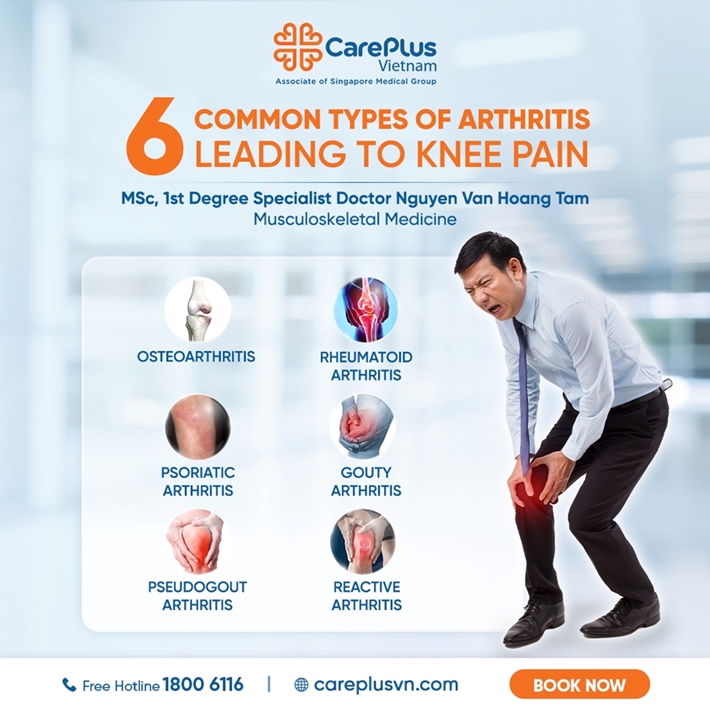6 COMMON TYPES OF ARTHRITIS LEADING TO KNEE PAIN
Arthritis occurs when the cartilage in the joints wears down, causing the bones to rub together and leading to severe swelling and joint pain. Discover the 6 common types of arthritis leading to knee pain and learn how to prevent and effectively manage the condition.

10/3/2024 3:13:10 PM
😣 Knee pain is often considered a condition of the elderly; however, in reality, it can also occur in young people, signaling potential underlying diseases. It may result from trauma or be a symptom of arthritis.
✅ Join MSc, 1st Degree Specialist Doctor Nguyen Van Hoang Tam—Musculoskeletal Medicine, as he outlines the 6 common types of arthritis that cause knee pain and their impact on health in the article below!
⚡ Knee arthritis is a condition where the cartilage - the "shock absorber" that protects the ends of the bones - gradually wears down over time. As a result, the bones tend to rub against each other, causing pain during movement and activity. Common types of knee arthritis include osteoarthritis, rheumatoid arthritis, psoriatic arthritis, gouty arthritis, pseudogout arthritis, and reactive arthritis.
1/ Osteoarthritis
This is the most common type of arthritis affecting the knee. In the knee joint, cartilage covers the ends of the tibia (shinbone), the bottom of the femur (thighbone), and the back of the patella (kneecap). Osteoarthritis occurs when this cartilage breaks down.
❗ In the early stages of knee osteoarthritis, the patient may only experience pain during certain activities, such as running. However, as the condition progresses to more severe stages, daily activities like walking, cycling, or even household chores can cause significant pain.
Post-traumatic arthritis can also be considered a type of osteoarthritis. It develops after meniscal tears, ligament injuries, or other knee traumas. Even though the injury might heal, there remains a risk of accelerating cartilage wear. Notably, post-traumatic osteoarthritis may not show symptoms until many years after the initial injury.
2/ Rheumatoid Arthritis
❗ Knee pain can be caused by an autoimmune disease called rheumatoid arthritis. This condition leads to swelling, stiffness, warmth, and pain in the knee joints. If not treated promptly, rheumatoid arthritis can cause permanent damage to the knee joints.
Rheumatoid arthritis often affects joints symmetrically, so if one knee joint is affected, the other knee is likely to be affected as well.
3/ Psoriatic Arthritis
❗ Similar to rheumatoid arthritis, psoriatic arthritis is an autoimmune disease. This type of arthritis is found in individuals with psoriasis and causes pain, stiffness, and swelling when touching the joints. Recent studies indicate that approximately 20% of people with psoriasis may develop psoriatic arthritis.
4/ Gouty Arthritis
❗ Gout can cause the accumulation of uric acid crystals (monosodium urate) in the knee joint. These microscopic, needle-like crystals build up in the soft tissue of the knee joint, potentially irritating the synovial and causing severe pain, as well as swelling, redness, and warmth in the joint.
In fact, about 50% of gout cases affect the big toe joint, but it can also affect the knee joint or other joints.
5/ Pseudogout Arthritis
❗ Similar to gout, pseudogout is caused by the accumulation of calcium pyrophosphate crystals. Doctors often refer to pseudogout as calcium pyrophosphate deposition disease (CPPD).
These tiny crystals in the joint can lead to sudden, severe knee pain, swelling, warmth, and redness. Pseudogout is less common than gout but more likely to affect the knee joint.
6/ Reactive Arthritis
❗ Reactive arthritis often affects the knee joint, though it can impact any other joint as well. This condition typically arises after the body has been infected by gastrointestinal illnesses (such as food poisoning or enteritis) or sexually transmitted diseases (STDs). Symptoms can appear a few days, weeks, or even months after the infection has cleared up, manifesting as pain in one or more joints or eye inflammation.
Overall, the knee joint is crucial for performing daily movements such as walking, standing up, sitting down, and running. As a major joint that endures significant forces and a wide range of motion, it is highly susceptible to injury. Therefore, maintaining knee joint health is extremely important.
✅ To prevent the 6 types of arthritis mentioned above, follow these recommendations from CarePlus' experts:
- Address regular musculoskeletal health screenings (at least every 6 months) to detect potential risks early.
- See a doctor immediately if you experience any unusual symptoms to receive an accurate diagnosis and appropriate treatment plan.
- Modify daily habits that impact musculoskeletal health: correct your sitting posture (keep your back straight, avoid leaning forward), exercise regularly, and engage in sports.
👉 If you notice symptoms such as swelling, stiffness, or sharp pain in the knee joint, contact us immediately for timely diagnosis by our experienced musculoskeletal specialists and advice on the most appropriate treatment methods.
CAREPLUS INTERNATIONAL CLINICS
Associate of Singapore Medical Group
Hotline: 1800 6116
Email: info@careplusvn.com
Fanpage: CarePlus Clinic Vietnam